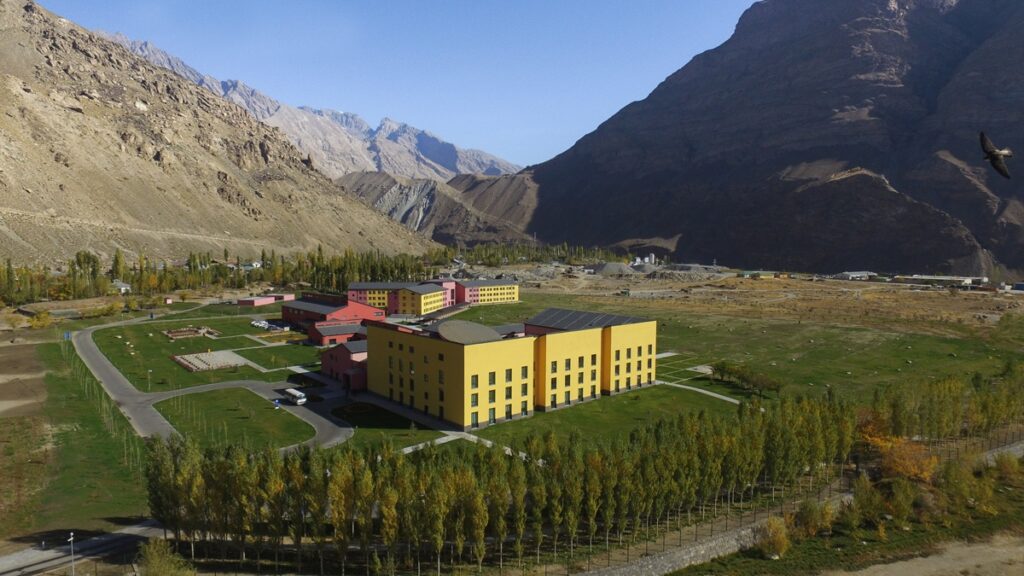Frankfurt, London (12/08 – 80)
It seems that the Aga Khan Development Network (AKDN) has become a hostage to its investments in Tajikistan.
In mid-July, the Prosecutor’s Office of the Gorno-Badakhshan Autonomous Oblast (GBAO) appealed to the Supreme Economic Court of Tajikistan with a demand to annul the land certificate for the campus of the University of Central Asia in Khorog, which is owned by the Aga Khan Development Network (AKDN). The university’s administration, local authorities, and the prosecutor’s office have not commented on this matter. However, it is evident that if the authorities manage to revoke the land certificate, the only international university in Tajikistan, built at a cost of one hundred million dollars, will be at risk of closure, as well as cooperation with one of the major donors in the country. Nevertheless, such relations with an investor are far from unique for Tajikistan.

AKDN has invested in various projects in Tajikistan. More than 3500 people work in the ranks of this structure within the country, and the largest investment projects have been implemented in the field of hydropower, telecommunications, tourism, the financial sector, education and healthcare.
The Silent Investor
Over the past year, the Aga Khan Development Network in Tajikistan has lost a number of real estate assets: buildings of MSDSP (Mountain Societies Development Support Program) and the First Microfinance Bank in Khorog, two Early Childhood Development Centers and the Aga Khan Lyceum in Khorog (https://www.agakhanschools.org/Tajikistan/AKL/Index), which belonged to the Aga Khan Education Service (AKES), as well as the Serena Hotel in Khorog, which was owned by the Aga Khan Foundation for Economic Development (AKFED). The total value of the nationalized real estate is unknown. The organization’s leadership in Tajikistan avoids communicating with the press.
According to AKDN, from 1995 to 2018, $1 billion was spent on various projects in Tajikistan. More than 3500 people work within this organization in the country, and the most significant investment projects have been realized in the fields of hydro energy, telecommunications, tourism, the financial sector, education, and healthcare.
Time is likely to tell whether AKDN will save its remaining assets with its silence, but in the context of Tajikistan’s delicate investment climate, such pressures on a major investor will not go unnoticed, as noted by independent experts.
An attack against one is a challenge to all
“The cessation of AKDN’s activities, one of the largest donors in the country, will serve as a signal to other donors about the government’s hostile attitude towards development assistance. Combined with rampant corruption, state interference in civil society activities, and restrictions on NGO operations, this will compel donors to reassess their operations in Tajikistan,” says Central Asia expert, Professor Edward Lemon from the University of Texas (USA).
According to him, the level of corruption, raiding of businesses by semi-official circles, limited resources, and low level of education make Tajikistan less attractive compared to neighboring countries, which will restrict the authorities’ efforts to attract investments.
Tajikistan is currently in the process of implementing the “National Development Strategy until 2030,” which was adopted in 2016. According to calculations by developers, the full implementation of this strategy requires attracting $118.1 billion. This amount is expected to be comprised of both domestic and foreign investments.
Political analyst Sayfullo Safarov believes that Tajikistan has all the potential to attract this amount. “Financially and economically, the republic is steadily developing, and the construction of the Rogun Hydroelectric Power Plant provides additional opportunities. The investment climate in the country is quite healthy, and I notice there are many interested individuals who prefer to invest specifically in Tajikistan,” says Safarov.
Risky Investments
However, the volume of foreign investments in Tajikistan’s economy is at an extremely low level compared to other countries in the region.
In the past, several major investors faced legal disputes in Tajikistan, losing cases or being pressured to exit the market or pay substantial tax fines. Among them there are companies, such as: the company “RUSAL,” which built a five-star hotel and a business center in Dushanbe and faced tax committee claims amounting to $70 million; “Gazprom International,” which surrendered its exploration license due to the government’s refusal to provide tax incentives; the mobile companies TCELL fined 155 million somoni, “Megafon” fined 155 million somoni, and “Beeline” fined 153 somoni.
In the embrace of a single investor
In the U.S. Department of State’s Investment Climate Report, Tajikistan is listed among the “challenging places for conducting business with high risks for foreign investors.”
One of the main barriers to foreign investment is the weak rule of law, especially concerning property rights.
The document notes that “trade agreements are in fact very poorly protected by the justice of the country, and the judges are not independent, and in several cases the government had influence on them to obtain a favorable decision for him.”
Despite the fact that Tajikistan is a member of many judicial resolutions, the authors of the report noted that the republic does not have an internationally recognized system of arbitration, and judges do not always recognize the supremacy of international documents.
“Numerous factors already render Tajikistan unattractive to investors, but if they also perceive the possibility of donor-funded assets being nationalized, they are unlikely to be willing to come, as opposed to donors who contribute with beneficial intentions. Only a Chinese investor might consider coming, but as we know, they come with terms that practically channel most of the revenue back to them, while the country ends up owing them even more,” says journalist Ramzia Mirzobekova.
The total volume of foreign investments inflow into Tajikistan’s economy amounted to approximately $11 billion. These funds originated from 65 countries around the world, with China, Russia, the United Kingdom, the United States, and Kazakhstan occupying the main positions.

